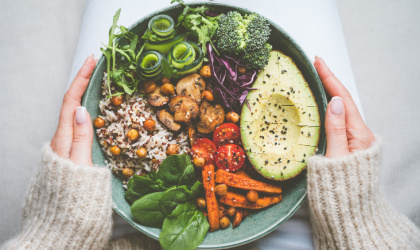
Cholesterol gets a bad rap. But it’s all about striking the right balance. Everyone has cholesterol; we need it for normal cell function, hormone production, and the manufacture of vitamin D3. We just need to avoid too much ‘bad’ cholesterol since it risks our heart and circulation health.
Here, we take a look at how to manage cholesterol levels.
What is cholesterol?
Naturally produced in the liver, cholesterol is a fatty substance in the blood. There are two main types of cholesterol: one is considered to be ‘good’ (high-density lipoproteins, or HDL cholesterol), and the other is considered to be ‘bad’ (non-high-density lipoproteins, or non-HDL cholesterol). Too much non-HDL cholesterol can clog your arteries, the blood vessels that carry blood to your major organs, which may lead to heart problems.
How can I lower my cholesterol?

Get to know your fats
Cutting down the amount of fat you eat is one of the best ways to manage your cholesterol levels. However, not all fat is created equal. Saturated fats, often found in animal products, like processed meat, cheese, and butter, are known to increase non-HDL cholesterol levels. On the other hand, unsaturated fats, found in seeds, extra virgin olive oil, walnuts, and avocado, lower cholesterol.
Swapping saturated fats for food high in unsaturated fats can make all the difference to your cholesterol.
-
Switch crisps for unsalted nuts
-
Replace whole milk with skimmed milk
-
Swap regular mince for leaner, lower-fat options
-
Switch processed or red meat for oily fish, chicken without the skin, or plant-based proteins, such as lentils or beans
-
Replace butter with vegetable oil spreads, like olive and sunflower
-
Order fewer takeaways!
Add more omega-3
On the subject of healthy fats, we have to mention omega-3 fatty acids. Found abundantly in oily fish, long-chain fatty acids, like EPA and DHA, play an important role in heart function. In fact, fewer people have heart disease in countries where people eat more oily fish, including Japan, Greenland, and the Mediterranean (1). If you’re vegetarian or vegan, you can still find omega-3s in flaxseed, nuts, seeds, and green leafy vegetables. These plant-based sources contain ALA, which contributes to the maintenance of normal blood cholesterol levels.
Besides increasing your dietary intake of omega-3, you may also wish to take a high-strength fish oil or vegan alternative.
Fill up on fibre
Though fibre of every variety (hello, pulses, fruits, vegetables, whole grains, nuts and seeds) is a great addition for your heart health, oat and barley fibre deserve a special shoutout. Barley and oat fibre contain beta-glucans, which have been shown to lower blood cholesterol (2). They form a gel in the gut that binds to cholesterol-rich bile acids and stops them from being absorbed into the body.
In an ideal world, you should aim for 3g of beta-glucans daily. You can achieve this by eating three servings of the following foods each day:
-
A bowl of porridge (30g porridge oats)
-
250ml oat milk (providing at least 1g of beta-glucans per serving)
-
3 oat cakes
-
75g cooked pearl barley
You may also wish to take high-strength beta glucans, which will contribute to your overall intake when included as part of a healthy diet.
Think plant sterols
Naturally found in plant foods, like vegetable oils, nuts, seeds, fruits, and vegetables, plant sterols have a similar chemical structure to cholesterol. In combination with a healthy, balanced diet, plant sterols may support heart health and help maintain normal blood cholesterol levels in the circulation (3).*
Although plant sterols are naturally present in vegetable oils and grains, modern diets tend to be low in them. You may wish to take supplemental plant sterols, which can serve as a useful contribution to your overall daily intake.
(*A beneficial effect is obtained with a daily intake of at least 0.8g of plant sterols)
Eat more garlic
For years, garlic has been prized for its health-supporting properties. Amongst its long list of credentials, garlic may support normal cholesterol levels in the circulation when part of a healthy diet (4). There are countless ways to increase your intake of this pungent bulb: rub a peeled bulb over toasted bread, add it to homemade salsa, or stir it into pasta sauce.
Aside from adding garlic liberally to food, you may also wish to take garlic tablets. Our high-strength formula has been formulated with a unique coating and additional peppermint oil, so it doesn’t have any unpleasant aftertaste.
Step up the exercise
As with most areas of health, staying active is essential for your cholesterol. Movement increases your HDL cholesterol and decreases non-HDL cholesterol (5). Exercise also helps weight management, especially around your middle, which is important for heart health. Aim for at least 30 minutes of physical activity at least five days a week. Even a brisk walk will do!
Stub out smoking
Most of us are well aware of the implications of smoking – and cholesterol is no different. Smoking elevates non-HDL cholesterol, increasing the risk of health problems (6). Stubbing out this habit is one of the best things you can do for your cholesterol, heart, and overall health. Giving up can be hard, but you’re not alone. The NHS is a great place to start if you need help quitting.
Want to learn more?
If you’re looking for more help lowering or managing your cholesterol, please get in touch with our team of expert Nutrition Advisors, who are on hand to provide free, confidential advice.
References
-
Omega 3 fats (2023) HEART UK - The Cholesterol Charity. Available online: https://www.heartuk.org.uk/low-cholesterol-foods/omega-3-fats
-
Fibre (2023) HEART UK - The Cholesterol Charity.Available online: https://www.heartuk.org.uk/low-cholesterol-foods/fibre
-
Plant Sterols and Stanols - British Heart Foundation (2023). Available online: https://www.bhf.org.uk/-/media/files/publications/medical-information-sheets/plant-sterols-is13-2020.pdf
-
Ried. K, Toben. C, Fakler. P. Effect of garlic on serum lipids: an updated meta-analysis. Nutr Rev. 2013;71(5):282-99.
-
Exercise (2023) HEART UK. Available online: https://www.heartuk.org.uk/healthy-living/exercise
-
Quit smoking (2023). Available online: https://www.heartuk.org.uk/healthy-living/quit-smoking
Related Posts
Disclaimer: The information presented by Nature's Best is for informational purposes only. It is based on scientific studies (human, animal, or in vitro), clinical experience, or traditional usage as cited in each article. The results reported may not necessarily occur in all individuals. Self-treatment is not recommended for life-threatening conditions that require medical treatment under a doctor's care. For many of the conditions discussed, treatment with prescription or over the counter medication is also available. Consult your doctor, practitioner, and/or pharmacist for any health problem and before using any supplements or before making any changes in prescribed medications.

Keri
Keri Filtness has worked in the Nutrition Industry for 19 years. She is regularly called upon for her professional comments on health and nutrition related news. Her opinions have been featured by BBC3, Prima, Vitality, The Mirror, Woman’s Own and Cycling Weekly, amongst others. She has also worked one to one with journalists, analysing their diets and health concerns and recommending changes and additions, where appropriate.



